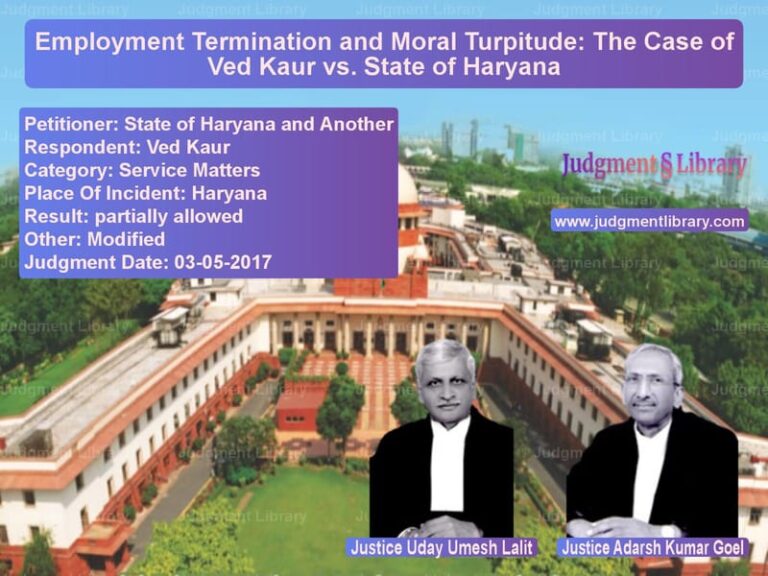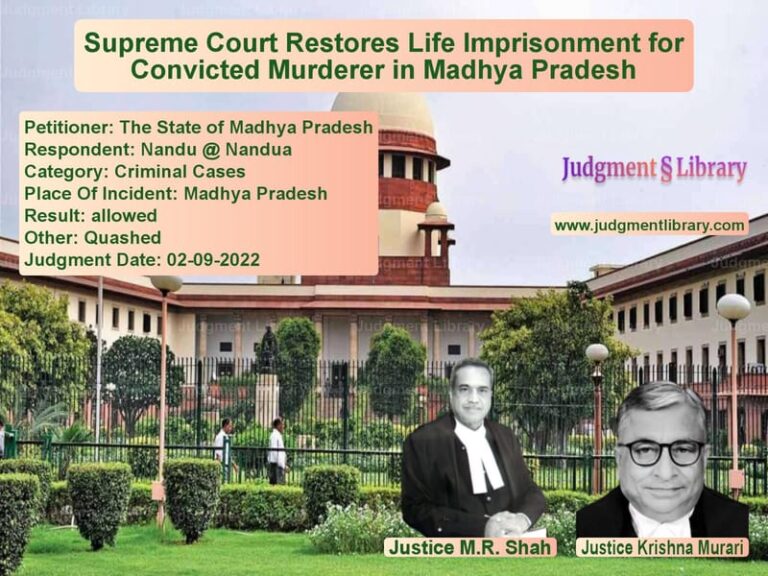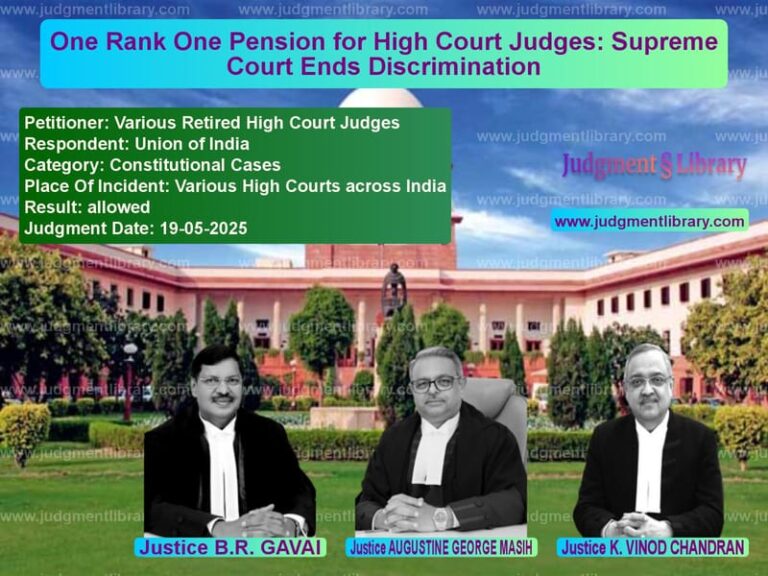Challenging Revenue Orders: Supreme Court Upholds Civil Court’s Jurisdiction in Land Dispute
The case of Pooran Singh vs. Dhaniram (since dead) thr. Legal Heirs revolves around the question of jurisdiction of civil courts in disputes related to land orders passed by revenue authorities under the Madhya Pradesh Land Revenue Code. The Supreme Court, in its judgment delivered on March 14, 2019, ruled on whether civil courts can entertain suits involving land matters when a statutory provision bars their jurisdiction. The case centers around the interpretation of Section 257 of the Madhya Pradesh Land Revenue Code, 1959, which prohibits civil courts from deciding matters that fall within the jurisdiction of revenue officers.
The case originated from a dispute regarding the land belonging to an aboriginal tribal member, which was transferred to a non-tribal under a sale deed executed in 1964. The appellant, Pooran Singh, who was the son of the original landowner, sought to challenge the sale of land and its reversion under Section 170B of the Madhya Pradesh Land Revenue Code. The key question in the case was whether a civil court had the jurisdiction to entertain a suit challenging a revenue order passed under Section 170B after the High Court had already dismissed a writ petition in 1987, upholding the order of the Collector.
Background of the Case
The case began in 1964 when Beniram Gond, a member of a notified Scheduled Tribe, executed a sale deed of agricultural land in favor of Dhaniram, a non-tribal. The sale was made for a consideration of Rs. 2,400, and the suit property consisted of 5.36 acres of agricultural land located in the village of Naragaon, District Durg, Madhya Pradesh (now Chhattisgarh). The appellant, Pooran Singh, the son of the original landowner Beniram, filed a suit under Section 170B of the Madhya Pradesh Land Revenue Code, 1959, for the reversion of the land.
After a long legal battle, the Sub-Divisional Officer (SDO) of Balod initially rejected the application in 1984. However, the Collector of Durg allowed the appeal in 1985, directing the reversion of the land back to Beniram’s heirs. This decision was challenged in a writ petition before the Madhya Pradesh High Court, which dismissed the petition in 1987, affirming the Collector’s decision.
In 1992, after the dismissal of the writ petition, Dhaniram’s heirs filed a civil suit seeking a permanent injunction and possession of the land, claiming that the revenue authorities’ orders were flawed and should be overturned. The trial court dismissed the suit in 1995, but the District Judge in 1996 allowed the appeal and decreed the suit in favor of Dhaniram’s legal heirs.
The appellant then filed a second appeal before the High Court, which was dismissed on 25 February 2015, leading to the current appeal before the Supreme Court.
Legal Issues Raised
- Whether a civil court has jurisdiction to entertain a suit challenging a revenue order passed under Section 170B of the Madhya Pradesh Land Revenue Code, 1959.
- Whether the statutory bar under Section 257 of the Land Revenue Code precludes civil courts from adjudicating land disputes involving revenue orders.
- Whether the decision in the writ petition filed in 1987 is binding and prevents further legal proceedings in civil court.
Arguments by the Petitioner (Pooran Singh)
The appellant, Pooran Singh, represented by his legal counsel, made the following arguments:
- The Civil Court has jurisdiction to entertain suits concerning revenue matters where the legality of a revenue officer’s decision is in question.
- Section 257 of the Madhya Pradesh Land Revenue Code cannot bar the jurisdiction of civil courts in all circumstances, especially when issues of fraud or errors in the revenue decision are involved.
- The order of the Collector in 1985 should be revisited as it was obtained by misrepresentation and did not follow due process.
- The earlier writ petition in 1987 was dismissed on technical grounds, and the current suit raises new issues that were not considered at that time.
Arguments by the Respondent (Dhaniram’s Legal Heirs)
The respondents, legal heirs of Dhaniram, argued:
- The High Court’s decision in 1987 is final and binding, and the appellant cannot relitigate the same issue in a civil suit.
- The matter is strictly governed by Section 170B of the Madhya Pradesh Land Revenue Code, which gives exclusive jurisdiction to revenue authorities over the reversion of land from non-tribals to tribals.
- The bar under Section 257 precludes any civil court from entertaining suits related to orders passed by revenue officers.
- The appellant’s failure to raise the relevant issues before the fact-finding authorities in earlier proceedings prevents him from doing so now.
Supreme Court’s Judgment
The Supreme Court ruled in favor of the appellant, Pooran Singh, and held that the civil court did have jurisdiction to entertain the suit. The Court observed:
- The High Court’s decision in 1987 did not preclude the appellant from filing a civil suit, as the civil suit raised new grounds that were not considered in the earlier writ petition.
- The statutory bar under Section 257 of the Madhya Pradesh Land Revenue Code did not apply in this case, as the issues at hand involved the legality of the revenue officer’s decision.
- The Court found that the earlier proceedings did not adequately address whether the sale of the land was fraudulent, and thus, the civil suit was valid.
- The Court emphasized that the jurisdiction of civil courts cannot be excluded in cases where there is a question of fraud or fundamental errors in the revenue order.
The Court observed:
“The fact that the High Court dismissed the writ petition in 1987 does not preclude the appellant from seeking a remedy in a civil court. The issues raised in the civil suit, especially those related to fraud and procedural errors, were not adequately addressed in the earlier proceedings.”
The Court allowed the appeal and set aside the High Court’s order dated 25 February 2015. The Court restored the trial court’s decision, dismissing Civil Suit No. 20A of 1992, which was filed by Dhaniram’s legal heirs.
Key Takeaways from the Judgment
- Civil courts have jurisdiction in land disputes involving revenue orders, particularly when fraud or procedural errors are alleged.
- The statutory bar under Section 257 of the Madhya Pradesh Land Revenue Code does not apply universally to all matters related to revenue orders.
- The principles of judicial review allow for challenges to revenue orders that have significant errors or issues of fraud.
- The finality of High Court judgments does not necessarily bar further legal proceedings in civil court if new issues are raised.
Conclusion
The Supreme Court’s ruling in Pooran Singh vs. Dhaniram (since dead) thr. Legal Heirs reaffirms the principle that civil courts can entertain suits challenging revenue orders when substantial legal grounds are raised, such as fraud or procedural errors. This judgment provides clarity on the jurisdictional limits and the circumstances under which civil courts can intervene in land disputes under the Madhya Pradesh Land Revenue Code.
Petitioner Name: Pooran Singh.Respondent Name: Dhaniram (since dead) thr. Legal Heirs.Judgment By: Justice Dhananjaya Y. Chandrachud, Justice Hemant Gupta.Place Of Incident: Durg, Madhya Pradesh.Judgment Date: 14-03-2019.
Don’t miss out on the full details! Download the complete judgment in PDF format below and gain valuable insights instantly!
Download Judgment: Pooran Singh vs Dhaniram (since dead Supreme Court of India Judgment Dated 14-03-2019.pdf
Direct Downlaod Judgment: Direct downlaod this Judgment
See all petitions in Property Disputes
See all petitions in Landlord-Tenant Disputes
See all petitions in Judgment by Dhananjaya Y Chandrachud
See all petitions in Judgment by Hemant Gupta
See all petitions in allowed
See all petitions in Quashed
See all petitions in supreme court of India judgments March 2019
See all petitions in 2019 judgments
See all posts in Civil Cases Category
See all allowed petitions in Civil Cases Category
See all Dismissed petitions in Civil Cases Category
See all partially allowed petitions in Civil Cases Category







